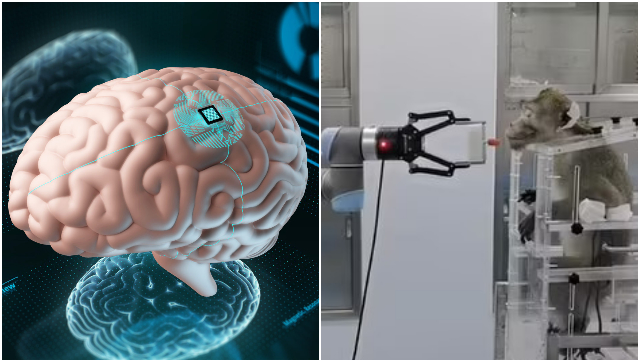Researchers at Nankai University in China made an announcement regarding their development of a BCI or a brain-computer interface. They claim that this implant enables a monkey to control a robotic arm solely using its mind. The researchers view this achievement as a significant breakthrough that has the potential to enhance the lives of individuals with disabilities. The brain-computer interface converts electroencephalogram (EEG) signals from the monkey’s brain into control commands, allowing it to operate the robotic arm, which is equipped with food. It’s important to note that the research conducted by the team at Nankai University has not undergone peer review, and the claims made in the announcement have not been independently verified. Taking BCIs a step further According to the announcement, the trial was led by Professor Duan Feng and involved collaboration with the General Hospital of the Chinese People’s Liberation Army (301 Hospital) and Shanghai Xinwei Medical Technology Company Ltd. **Also read: Mind Hunter: Scientists develop ChatGPT-like tool that turns people’s thoughts into text in real-time** The experiment builds upon previous work with interventional brain-computer interface experiments involving animals, specifically sheep. The announcement mentions the utilization of EEG signal recognition and other core technologies. The university also shared an image depicting the surgical procedure performed on the sedated monkey, where the doctors are seen monitoring the procedure on a screen while the monkey lies on a table. In the announcement, the researchers explain that the interventional brain-computer interface developed by Professor Duan Feng’s team involves attaching an interventional EEG sensor to the monkey’s brain vessels without the need for invasive craniotomy. This method allows for the collection of intracranial EEG signals. How does the new BCI work? The interventional EEG sensor is inserted through the jugular vein, travels to the sagittal sinus, and reaches the motor cortex area of the brain. Following the surgical procedure, the researchers were able to successfully collect and recognize EEG signals. **Also read: Biotech firm beats Elon Musk’s Neuralink, has implanted brain chips in 50 people for ailments** This enabled the monkey to actively control the robotic arm. The announcement emphasizes the consideration of security and stability in developing a type of brain-computer interface that is both non-invasive and effective. “The results of the interventional brain-computer interface experiment carried out in the brains of non-human primates have promoted the advancement of interventional brain-computer interface from laboratory prospective research to clinical application, and will help promote,” according to Professor Duan Feng. “The industrial upgrading of medical enterprises, through the combination of medicine and industry to create a national brand of high-end medical equipment, will have broad market prospects in the field of brain disease medical rehabilitation in the future.” In the announcement, the researchers describe the development of an interventional brain-computer interface by Professor Duan Feng’s team. This interface involves attaching an interventional EEG sensor to the monkey’s brain vessels, eliminating the need for invasive craniotomy. By utilizing this method, the researchers were able to collect intracranial EEG signals. The mentioned device consists of an electrode placed beneath the scalp and a “prescription pod” that attaches to the user’s hair to provide power. It delivers small electrical pulses to the specific brain region affected by depression, specifically the left dorsolateral prefrontal cortex, for a duration of 15 minutes per day. The race to perfect human-worthy BCIs Another company, Synchron, initiated human trials of its brain implant in July last year. This implant allows the wearer to control a computer solely through their thoughts. The Stentrode brain implant, approximately the size of a paperclip, will be implanted in six patients with severe paralysis in New York and Pittsburgh. The Stentrode enables patients to control digital devices and perform daily tasks like texting, emailing, and online shopping using their thoughts. **Also read: Neuralink, Elon Musk's brain computer interface company is looking for human trial partners** Elon Musk’s Neuralink has also garnered attention, although it has faced controversy due to allegations of animal rights violations. In March, Neuralink’s request to conduct human testing with its chip was rejected by the US Food and Drug Administration (FDA). The FDA outlined numerous concerns that Neuralink must address before proceeding with human trials, which is a crucial step for final product approval. Lab notes from experiments conducted at the University of California Davis (UC Davis) raised similar concerns about animal issues related to the implants, aligning with the FDA’s apprehensions. Neuralink is under scrutiny due to animal advocacy groups and former employees raising concerns about animal welfare violations. The FDA’s rejection included a list of deficiencies that Neuralink must address before proceeding with human trials, according to multiple sources within Neuralink. Read all the Latest News , Trending News , Cricket News , Bollywood News , India News and Entertainment News here. Follow us on Facebook, Twitter and Instagram.
In a major breakthrough for BCIs and brain implants, scientists in China have developed a new implant that lets monkeys control a robotic arm using their minds. This is a feature that Elon Musk’s Neuralink and other BCI makers have been working on for years.
Advertisement
End of Article


)

)
)
)
)
)
)
)
)



